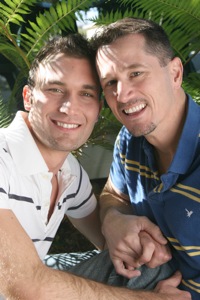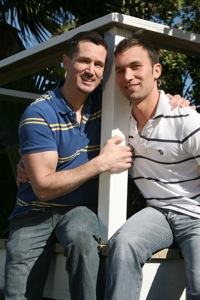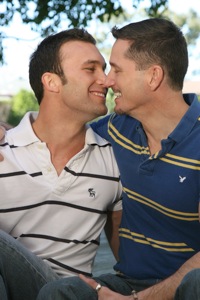-
- Man found guilty for injuring gay teenager and stabbing another man on trolley
- Transgender person assaulted with flashlight in Balboa Park
- Couple stabbed outside of CVS Pharmacy in Hillcrest
- San Diego Bulldogs to host first-ever wrestling tournament
- The Center and Momentum San Diego meet to energize repeal of ‘Don’t Ask, Don’t Tell’
- San Diego gets a whiff of art museum’s downtown expansion
- Community News
-
- Four Seattle-area gay men found with hard-to-treat strain of HIV
- Syndicated columnist, noted Texas liberal Molly Ivins dies
- Michigan court: Gay partners cannot get benefits from state universities, government agencies
- Before mea culpa, mayor’s missteps noticed in San Francisco
- Bush ready to sign off on massive spending bill
- GOP lawmaker offers same-sex union bill
- National News Briefs
- World News Briefs
feature
Playing the online dating game
Published Thursday, 08-Feb-2007 in issue 998
According to the Pew Research Institute, online dating accounted for more than $470 million last year. That’s an increase of nearly 1200 percent in five years. That’s right. Not 12, not 120, but nearly 1200 percent – up from $40 million in 2001.
Some estimate as many as 20 percent of all Internet users engage in online dating, accounting for 70 percent of all dollars spent on the Internet. And, according to Forrester Research studies, 80 percent of gay men and 76 percent of lesbians are online. This is about the same number as straights, although gays are one third more likely to have broadband connections. Gays have also been online longer than heteros – 29 percent of gays, compared with 18 percent of straights, have been cyber surfing for more than seven years.
GLBT community online-dating pioneers
It isn’t especially surprising that gays and lesbians pioneered the online dating community, given that the Internet enables gays and lesbians to meet specific cultural needs, says Michael Vigorito, a licensed marriage and family therapist in San Diego. Vigorito cites needs such as reducing psychological and geographical isolation, the need to meet others with uncommon sexual proclivities, the need to find safe, non-shaming communities, and the need for “a niche where [gays] can be uncensored and open in their exploration of sexuality,” by way of example.
Some sites virtual Castros and Hillcrests
“Historically, there was a movement after World War II to the urban centers of the country,” Vigorito explains. “In urban areas, LGBT people had the opportunity to meet other LGBT persons, and physical proximity created opportunities for relationships or sexual encounters. But … those who remained in the suburbs and in rural communities … had little opportunity for social or sexual contacts within their smaller communities. Some Web sites, then, became a virtual Castro or Hillcrest where LGBT people in those more isolated areas could connect.”
In particular, Vigorito says, online dating provides a venue for people who have uncommon sexual proclivities and turn ons. “When people have an arousal dependent on certain situations or objects, one that only a small percentage of the population has, it’s more difficult to meet other people who share this arousal, and attempting to do so can have some risks. Prior to the Internet, one would have to step into society further than one’s comfort zone might [allow]. And for some, that creates anxiety or fear.
“For example,” he says, “let’s say a person is aroused by themes of dominance during sex. In order to meet other people for mutual exploration and enjoyment of this interest, one might have to go to a BDSM party or join a leather organization. These events may only take place a certain number of times per year, or may require participation at a level that a person is not willing to commit. In other words, a person might not be ready to publicly disclose this aspect of his eroticism. With the Internet, there are opportunities to meet like-minded individuals in a less exposed, more relaxed environment.”
Modern dating and the language of hookup
Regardless of the reasons we’ve grown so cyber savvy, one thing’s for sure, online dating is here to stay and, over the years, it’s become a lot more interesting.
Internet dating really began to catch on in the late ’90s, when the “profile” system, a method of matching people based on self-submitted information, developed. The profile system uses surveys to match participants by interests, desired characteristics, and/or psychological tests to estimate compatibility. Today, the profile is still the most popular way of meeting a match, but it has a few more features. Not only can users post textual information about themselves, they can also post photos, text, video and audio. And instant messaging enables conversations in “real time” via messages sent between users online at the same time, either one-on-one, or in “chat rooms,” where several users congregate virtually at once.
Getting the wires crossed
Understanding the conversation in these chat rooms and dating sites isn’t exactly easy at first, says Vince Edwards, 46, of North Park.
According to the Pew Research Institute, online dating accounted for more than $470 million last year. That’s an increase of nearly 1200 percent in five years. That’s right. Not 12, not 120, but nearly 1200 percent – up from $40 million in 2001. “You have to know a lot of the lingo or shortcuts that people use in their conversation,” Edwards explains. “It’s like that game show they used to have about the license plates, where the contestants had to guess what the license plate meant. Someone might type, ‘C U L8R’ and mean ‘See you later.’”
OK, admits Edwards, that was an easy one. But not so fast. He gives this example:
Person 1: up 4 meet?
Person 2: only if meat!
Person 3: ROTFLMAO
Person 4: k where?
[Person 5 joins the chat room]
Person 5: wassup?
Person 2: our meat
Person 3: LOL
Person 5 cnt me n
Person 5 again: is it any good?
Person 1: check prof, WYSIWYG
“Sometimes I feel like I should have studied IM as a second language instead of French,” Edwards says.
The confusion extends beyond the technology. Even though 31 percent of Americans know someone who has used an online dating Web site, 26 percent know someone who’s gone on a date with someone they met online, and 15 percent say they know someone who is married or partnered in a long-term relationship with a person they met online, not everyone understands the appeal of online dating.
“Friends will call and say, ‘Hey, what are you up to?’ and I will be, like, ‘Well, I’m talking to a guy online,’” says Curtis Rogers, 38, of University Heights.
“And they’re like: ‘Why do you do that? You know everyone is just there for sex and they never are really who they say they are.’”
Perils
Rogers admits that many people he’s met online are indeed just there for sex. In fact, says Vigorito, the Internet is a common outlet for people who have sexual compulsions – a reality referred to as the “Triple A Engine.”
The term means “accessibility, affordability and anonymity,” Vigorito says. “The underlying premise is that people have easy access to sexual stimulation that is affordable and that, in theory, is anonymous.”
But the Internet is not anonymous. “People do not always realize that there’s [a] trail,” Vigorito says.
Another major issue facing the online dating community is HIV. A study of behavior among Southern California men who have sex with men who have recently become infected with HIV concluded that, while men who used the Internet to find sexual partners were no more likely to have unprotected anal intercourse (UAI) than men who found sexual partners through other venues, there was a significant difference in the number of men who accurately disclosed their status.
Further, the study found that a significantly higher percentage of sexual partners were basing their decisions about whether to have UAI or to use protection on the HIV status indicated in the profile. Because that indication is frequently inaccurate, these men are at significantly more risk of contracting the virus.
Yet, while the Internet creates the potential for misunderstandings and misrepresentation, it could also prove extremely effective in reducing the rate of HIV. “By offering a level of anonymity, the Internet could be a powerful tool to aid in serostatus disclosure and negotiation of harm reduction sexual practices,” the study’s authors say.
Pleasures
Obviously, given online dating’s popularity, the pleasures outweigh the perils. Just ask Tony Cashion, 50, of Kensington. Last July, Cashion met his current boyfriend, Ken, on a site called Adam4Adam.
“He sent me an online message, and we agreed to meet at Kensington Coffee Shop,” Cashion recalls.
“We had talked for about a week before we agreed to meet. We met and spent about three hours talking. Obviously, there was interest on both parts, so he came over that evening, and we have been together ever since.”
Even Edwards, although confused by online lingo, is optimistic. “Who knows,” he muses. “Maybe some day I’ll marry some man and everyone can be there for the wedding: “Do u, sdguy4guy, take this man, sdcoolguy, 2 b ur huzbear 2 have & 2 hold til death do u part?”
|
|
Copyright © 2003-2025 Uptown Publications




